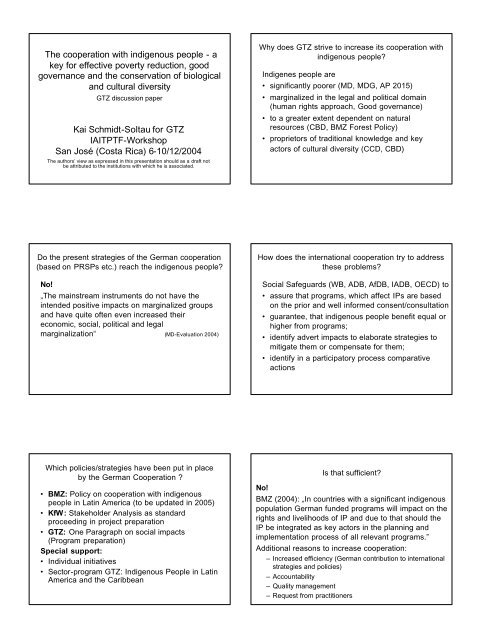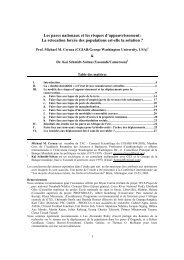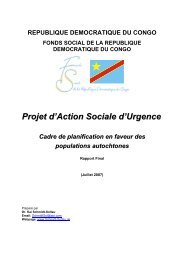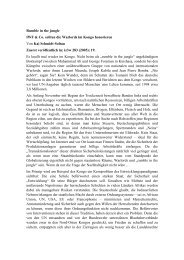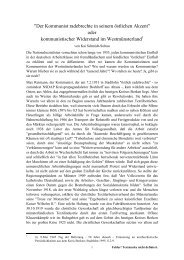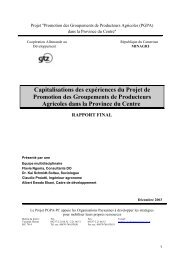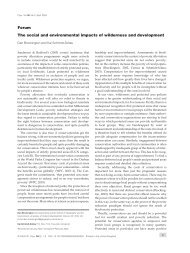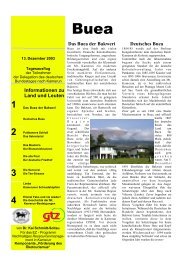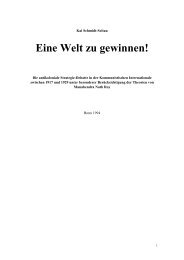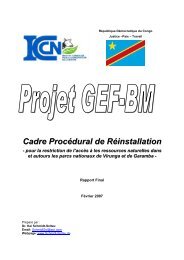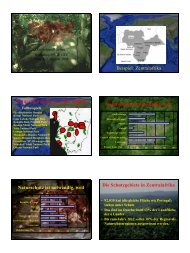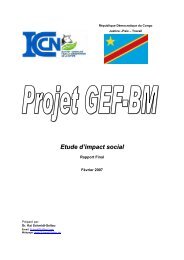GTZ & IP_San Jose_final - Dr. Kai Schmidt-Soltau
GTZ & IP_San Jose_final - Dr. Kai Schmidt-Soltau
GTZ & IP_San Jose_final - Dr. Kai Schmidt-Soltau
You also want an ePaper? Increase the reach of your titles
YUMPU automatically turns print PDFs into web optimized ePapers that Google loves.
The cooperation with indigenous people - a<br />
key for effective poverty reduction, good<br />
governance and the conservation of biological<br />
and cultural diversity<br />
<strong>GTZ</strong> discussion paper<br />
<strong>Kai</strong> <strong>Schmidt</strong>-<strong>Soltau</strong> for <strong>GTZ</strong><br />
IAITPTF-Workshop<br />
<strong>San</strong> José (Costa Rica) 6-10/12/2004<br />
The authors’ view as expressed in this presentation should as a draft not<br />
be attributed to the institutions with which he is associated.<br />
Why does <strong>GTZ</strong> strive to increase its cooperation with<br />
indigenous people?<br />
Indigenes people are<br />
• significantly poorer (MD, MDG, AP 2015)<br />
• marginalized in the legal and political domain<br />
(human rights approach, Good governance)<br />
• to a greater extent dependent on natural<br />
resources (CBD, BMZ Forest Policy)<br />
• proprietors of traditional knowledge and key<br />
actors of cultural diversity (CCD, CBD)<br />
Do the present strategies of the German cooperation<br />
(based on PRSPs etc.) reach the indigenous people?<br />
No!<br />
„The mainstream instruments do not have the<br />
intended positive impacts on marginalized groups<br />
and have quite often even increased their<br />
economic, social, political and legal<br />
marginalization“ (MD-Evaluation 2004)<br />
How does the international cooperation try to address<br />
these problems?<br />
Social Safeguards (WB, ADB, AfDB, IADB, OECD) to<br />
• assure that programs, which affect <strong>IP</strong>s are based<br />
on the prior and well informed consent/consultation<br />
• guarantee, that indigenous people benefit equal or<br />
higher from programs;<br />
• identify advert impacts to elaborate strategies to<br />
mitigate them or compensate for them;<br />
• identify in a participatory process comparative<br />
actions<br />
Which policies/strategies have been put in place<br />
by the German Cooperation ?<br />
• BMZ: Policy on cooperation with indigenous<br />
people in Latin America (to be updated in 2005)<br />
• KfW: Stakeholder Analysis as standard<br />
proceeding in project preparation<br />
• <strong>GTZ</strong>: One Paragraph on social impacts<br />
(Program preparation)<br />
Special support:<br />
• Individual initiatives<br />
• Sector-program <strong>GTZ</strong>: Indigenous People in Latin<br />
America and the Caribbean<br />
No!<br />
Is that sufficient?<br />
BMZ (2004): „In countries with a significant indigenous<br />
population German funded programs will impact on the<br />
rights and livelihoods of <strong>IP</strong> and due to that should the<br />
<strong>IP</strong> be integrated as key actors in the planning and<br />
implementation process of all relevant programs.”<br />
Additional reasons to increase cooperation:<br />
– Increased efficiency (German contribution to international<br />
strategies and policies)<br />
– Accountability<br />
– Quality management<br />
– Request from practitioners
Proposed process<br />
Proposed definition of indigenous people<br />
• Property and user rights (often non-formal) and/or<br />
close attachment to and dependence (social/<br />
economic) on land and natural resources<br />
• self-identification as members of a distinct cultural<br />
group (culture, language, social and political<br />
institutions)<br />
• Marginalization in the legal, social, political and<br />
economic domain<br />
• Question 1:<br />
• It has been suggested that <strong>IP</strong>s and local<br />
communities should be - following the logic of the<br />
CBD - addressed in one policy? Do you agree or<br />
would you recommend a specific policy for<br />
indigenous people?<br />
Proposed elements of the policy<br />
1. Why does <strong>GTZ</strong> strive to cooperate with <strong>IP</strong> even<br />
more than with other populations?<br />
Poverty reduction, good governance, CBD, CCD<br />
2. Who is addressed in this policy?<br />
Definition of indigenous people see above<br />
3. What is the German aim in this cooperation?<br />
Assist <strong>IP</strong> in getting, defending and using their rights<br />
4. What is the mandate of this policy?<br />
Binding for <strong>GTZ</strong> and all projects receiving <strong>GTZ</strong><br />
support; guideline for German private sector<br />
Proposed elements of the policy<br />
5. What is the guiding principle of this cooperation?<br />
Well and prior informed consent on all interventions,<br />
which might have an impact on <strong>IP</strong>, their<br />
rights, livelihoods etc.<br />
6. Which methods and instruments will be put in place<br />
to achieve this?<br />
Social Assessment & Indigenous People<br />
Development Plan.<br />
7. Which support/assistance is provided by <strong>GTZ</strong>?<br />
see proposed areas of assistance<br />
8. How does this cooperation address conflicting<br />
cultural issues?<br />
I don’t know. Any idea??<br />
Proposed elements of the policy<br />
9. How does <strong>GTZ</strong> address the issues of traditional<br />
knowledge, access and benefit sharing?<br />
I hope to get an idea on this topic during the<br />
conference.<br />
10. How does <strong>GTZ</strong> guarantee the quality of its<br />
performance?<br />
Publication of all documents, regular fora for<br />
discussion and mutual learning, funds and<br />
capacity building for <strong>IP</strong>-organizations to<br />
supervise activities.<br />
11. Which structures will be put in place to achieve<br />
accountability?<br />
Inspection panel?<br />
Possible areas of specific assistance<br />
1. Legal advice, lobbying<br />
2. Technical assistance on land tenure issues,<br />
restitution, benefit sharing<br />
3. Land use mapping, demarcation of territories<br />
4. Capacity building in „modern“ natural resource<br />
management/ translation of indigenous practices<br />
and land use knowledge into „modern“ concepts =<br />
management plans, business plans (access and<br />
benefit sharing)<br />
5. Dual education<br />
6. Organizational development at community level
Possible areas of specific assistance<br />
7. Empowerment (representation at „higher“ levels)<br />
8. Capacity building in the establishment of strategic<br />
alliances via <strong>IP</strong>-organizations etc.<br />
9. Income generating activities and marketing of<br />
products<br />
10. Technical support in decision making processes on<br />
advantages/disadvantages of different development<br />
options (dissimilation/assimilation)<br />
11. Capacity building in intercultural communication for<br />
private and governmental service providers/actors<br />
12. Support in the establishment of fora to discuss with<br />
neighboring populations<br />
Next steps<br />
Stock taking<br />
• Revue experiences of <strong>IP</strong>-<strong>GTZ</strong> cooperation in all<br />
continents (formal and informal).<br />
• Obtain best practices and lessons learned from<br />
donors, other agencies and indigenous people.<br />
• Review the legal status of <strong>IP</strong>s (human rights, land<br />
rights, etc.) in partner countries and evaluate the<br />
cooperation between German supported sectorprograms<br />
and <strong>IP</strong>s<br />
• Gather information on possible instruments and<br />
methods of cooperation and review their outcomes.<br />
Next steps<br />
Next steps<br />
Development of policy and implementation<br />
guidelines<br />
• Exchange with governments, agencies, donors and<br />
indigenous people<br />
• Obtain feedback from indigenous people<br />
• Presentation on international conference with <strong>IP</strong>s<br />
• Strive to harmonize and enhance policies and<br />
guidelines according to best practice<br />
Direct actions<br />
• Elaboration of a checklist & documentations for<br />
actors/<strong>GTZ</strong> staff and consultants, which are<br />
working with indigenous people<br />
• Increase the dialog with indigenous people in all<br />
relevant programs and search for mutual<br />
solutions in situations where <strong>IP</strong> have been<br />
impacted negatively<br />
• Lobby for adaptation of policy at national level in<br />
Germany and partner countries<br />
• Enhance dialog with indigenous people<br />
We fear, that if we do nothing, we face a<br />
situation like that in the near future …<br />
Thank you for your attention and your<br />
inputs during the discussion<br />
<strong>Schmidt</strong>Sol@aol.com; www.<strong>Schmidt</strong>-<strong>Soltau</strong>.de


